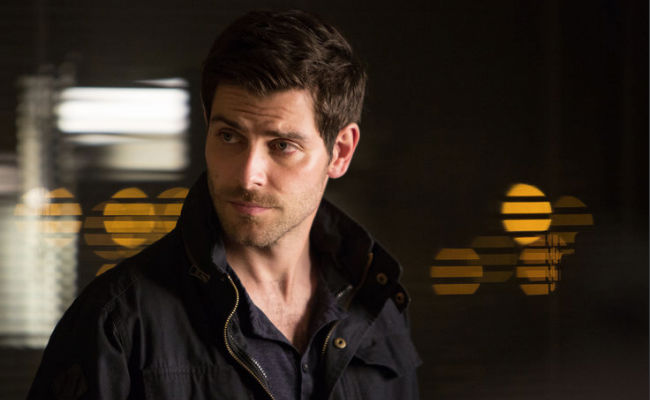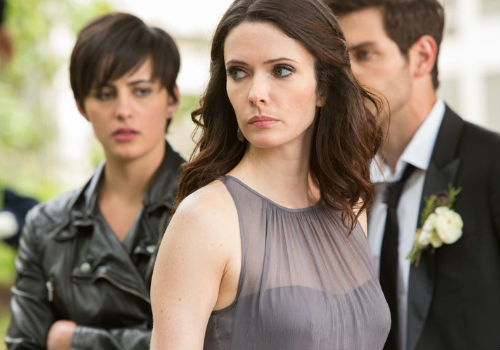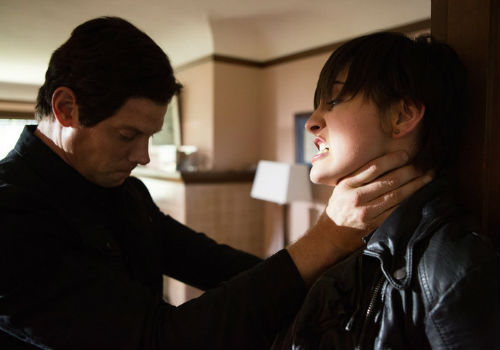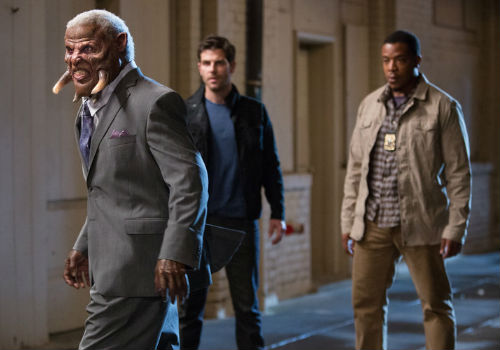
A protagonist with extraordinary powers or perceptive abilities is hardly a rarity in popular fiction.
Movies, TV shows, and books are full to the brim with men and women possessing superhuman strength, metamorphic talents or sensory abilities that allow them to see the dead, fight supernatural creatures and powers, fight battles beyond the understanding or capabilities of mere mortals.
What isn’t common is a protagonist being stripped of these abilities, of losing whatever made them unique, not just for a second or two, but for a sustained period of time.
It’s a brave decision, especially for weekly episodic television to do a Samson on your protagonist – the Biblical hero’s power came from his golden locks which when shorn away left him unable to slay entire armies with a jawbone of an ass or level pagan temples with a simple push of a pillar – who is usually the one around whom the narrative spins.
People turn in to see this character do their thing and when they can’t do it for reasons usually nefarious in nature, you run the risk that the show will find its usual storytelling vigour sapped.
But then Grimm isn’t just any old show, and Nick Grimm (David Giuntoli) isn’t just any old protagonist, blithely going about his business, despatching baddies left and right without any though or troubling conviction.
He, and has been, from the start, a thinking person’s protagonist, a man who didn’t ask for the mantle of responsibility thrust upon him, to police and hunt Wesen (human/animal hybrid creatures that who true nature is only visible to Grimms) and who four seasons into his reign as Portland’s ruling Grimm, struggles to reconcile his old life as a police detective with his new far more supernatural calling.
It makes Nick a complex, anti-hero of sorts who has gone against the ancient precepts of his people and forged bonds of friendship with those Wesen inclined to set aside old enmity and fear, while still doing what must be done, as much within the law as possible given his vocation, to curtail the worst excesses of Wesen who largely live among humanity unnoticed and unheralded.
Season 4 of Grimm has made good use of Nick’s conflicted relationship with his calling, stripping him off his powers via a spell cast by Adalind Schade (Claire Coffee), and leaving him and his equally conflicted fiancee Juliette (Bitsie Tulloch), police partner Hank (Russell Hornsby) and friends, husband and wife Wesen Monroe (Silas Weir Mitchell) and Rosalee (Bree Turner) to pick up the pieces.
It’s woven a whole extra level of existential complexity into an already well-written, well-made show and there are three things in particular that I am loving about the show as a result.

NICK ISN’T SURE WHO HE IS ANYMORE … AND JULIETTE ISN’T SURE WHICH VERSION OF HIM SHE WANTS
From the very start Nick has struggled with being a Grimm.
The revelation by his Aunt Marie (Kate Burton) that he was a Grimm, who it turned out were not just storytellers but Wesen-fighting machines charged with keeping their enemies in check by any means required, was an unexpected and initially unwelcome addition to an already full but reasonably normal life that included a loving girlfriend and a successful career as a Portland P. D. detective.
In other words, Nick’s life was not exactly wanting and he was perfectly content with just being a good old-fashioned ordinary human being (helped along by the fact of course that he didn’t know there was an alternative).
But as time went on, and he grew accustomed to his powers, which include being able to see Wesen in their non-human or volged state, and familiar with the hidden supernatural world around him, he began to embrace his heritage, especially since it gave him an undeniable advantage on the job where it turns out, surprise surprise, a great deal of crime is committed by the less desirable Wesen elements (of which there seem to be an endless variety).
Sure it almost cost him a stable home life, his relationship with Juliette, his life, and any semblance of normality but realising he couldn’t exactly opt out of his calling – once a Grimm, always a Grimm essentially – he made his peace with it, did what he could with it, and subsumed any lingering concerns about any negative side-effects.
But in season 4, he has had to deal with the loss of these powers, thanks to Adalind, in a real, sustained way that hasn’t been truncated by one of those quick fixes beloved of writers when they want to get their protagonist back to their old self as quickly as possible.
Nick really has lost his powers, and while Monroe and Rosalee and Captain Renard’s Hexenbiest mother Elizabeth (Louise Lombard) are working feverishly hard to reverse the effects of Adalind’s spell – in quiet contravention of Juliette’s request that they go slow or even stop looking for a cure – you can hardly blame her; she has suffered greatly thanks to Nick’s Grimm calling, losing her memory among other things for a time – there is no sense that getting his powers back will be possible or even easy.
Nick’s loss is compounded by the fact that Theresa Rubel (aka “TRubel”, played by Jacqueline Toboni), a newly discovered Grimm, who has gone from possibly being the Scrappy Doo of the show – long time fans of Scooby Doo will appreciate that reference – is now his only way of seeing into a hidden supernatural world he once took for granted he would always be able to access.
It’s characteristic of Grimm’s approach to its storytelling from the start – don’t rush to set things right, let them linger, fester, wait and see what the characters do when they are forced to not only step out of their comfort zone but watch as it is flung so far away there are great doubts whether it will ever appear again.
Nick’s current existential angst is the latest brave decision by a production and writing team that understands that great drama comes from complication and uncertainty, and that the best thing you can do for a character, and the show, is to let things play out slowly and take your protagonist on what is proving, in Nick’s case, to be a very satisfying journey.
It’s likely he will get his powers back but in the meantime, watching him wrestle with the idea of who he really is, with or without the powers, and how that effects those he loves, is making for some seriously complex, clever television.

THINGS ARE GETTING WAY MORE COMPLICATED ON A SHOW ALREADY JAMMED WITH COMPLICATIONS
You would think that things would be plenty complicated enough in the world of Grimm, what with a multiplicity of Wesen to deal with, people such as Sergeant Wu (Reggie Lee) beginning to question the strange things they are seeing – frankly it’s a relief that people like Nick’s partner Hank and Juliette are now privy to Nick’s true, albeit temporarily lost, identity; it was all beginning to get a bit too Mr Snuffleupagus from Sesame Street-like there for a while – crimes committed by Wesen that can’t be explained in normal human terms making court cases more than a little challenging, conspiracies aplenty to deal with thanks to the Royal Wesen Houses and on, and on.
But somehow the writers of Grimm have managed to up the ante in season 4, a refreshing sign given that as shows age, the temptation to simply keep doing what you’re doing – all the more tempting when the show is as successful as Grimm is – is all too real.
Instead of business as usual though, which in Grimm terms consists of a case of the week procedural mixed in with an advancement with whatever arc is playing out at the moment, there are a whole lot of changes in play:
* the arrival of “TRubel”, who has fit in quite well with the existing characters, despite my concerns that she was a harbinger of Jumping the Shark-itis which sees new characters added in just to mix things up, often to deleterious effect.
But rather than being a cousin Oliver (The Brady Bunch) or Nick in Family Ties, Theresa so far is managing to work as a necessary addition to the cast, Nick’s essential eyes and ears into a Wesen world currently closed off to him.
She is also grappling with a whole new conspiracy, one headed by a person of dubious integrity, FBI Special Agent Chavez (Elizabeth Rodriguez) who kidnapped her off the street in the aptly-named “Octopus Head”, and held her captive in restraints while she tried to convince a sceptical Theresa to become a part of a shadowy organisation fighting to rid the world of problem Wesen.
Though she was released, it was with a thinly-veiled threat that telling anyone about what had transpired would result in some fairly unpleasant consequences, a nasty piece of manipulation that Theresa naturally ignored completely, clueing Nick in on the fact that the whole Wesen fighting schtick may have some competition from unexpected quarters.
If Nick losing his powers was quite enough complication already, the idea that there are others out there muddying the Grimm vs. Wesen waters add a whole other level of delicious intrigue to the show.
* Then there is Adalind’s flight back to Europe in search of the baby she mistakenly believes is in the hands of the scheming Royals, currently headed by the ethically-challenged, though handsome and beautifully-spoken Prince Viktor Chlodwig zu Schellendorf von Konigsburg (Alexis Denisof).
Not only has everyone’s favourite Hexenbiest been locked up in a dungeon infested with rats, she has now been “rescued” by a gibbering man in the next call who is frankly more than a few Wesen short of a herd who has led up staircases where stone faces appear from the wall, begin crying, flooding the stairwell (“Dyin’ on a Prayer”).
It’s a whole other level of supernatural weirdness to add to a considerable of Adalind-associated oddities and it will be interesting how it all plays out.
* And then there is the not inconsequential matter of Captain Renard’s mother suddenly reappearing just in the nick of time (no pun intended) to save his life with a rather magical black and red two-headed snake (one at each end) when he was, medically speaking, no longer of this world.
She has proved crucial in finding a possible cure for Nick’s condition, and is an integral power player, though long dormant it turns out, in the Machiavellian political machinations of the Wesen Royals who have not exactly been warm and hospitable to the good Captain and his poor mum in the past.
I doubt she is simply there to save Nick and seeing how she is used in the still-developing Royal conspiracy will be fascinating.
* Monroe and Rosalee are getting off scott-free either with evidence, courtesy of a specially-styled brick through the Spice Shop’s window that there are Wesen out there who don’t approve of their mixed-species marriage (he is a wolf-like Wieder Blutbad while she is a rodent-like Fuchsbau).
Properly handled, and I have every confidence it will be, this particular storyline opens up a whole raft of possibilities for the examination of prejudice, discrimination and the unwillingness of certain sections of society to abandon long-entrenched beliefs.
Didn’t I say there’s a lot going on, over and above what was already going on?
Yes indeed there is but you fortunately don’t get the feeling that the writers are doing it out of desperation in a bid to flag a troubled show – Grimm is anything but of course and could have conceivably kept going on with just the season 1-3 complications happily humming along in place – but rather as a natural extension of what was already organically happening.

HERE THERE STILL BE AWESOME “MONSTERS” … AND WESEN …
To be fair, it’s not really politically correct to call Wesen monsters.
To the uninformed, that is exactly what they appear to be but then neither Nick, TRubel, or any of their non-Grimm friends and loved ones, nor the viewers who have happily followed Grimm into its fourth creatively fertile series, could be considered even remotely uninformed.
What they are, according to the Grimm Wiki, “are parahuman, exhibiting two distinct sets of DNA within the same system”; they are also described as “liminal, that is, they display two states of existence simultaneous within one physical body.”
In other words, they are simply another form of sentient life on this planet, that is only as monstrous or noble as it chooses to be, much like home sapiens themselves.
This is where Grimm has been enormously clever in its mythos-building, refusing to cheaply and all-too-easily paint Wesen as disposable monsters to terrify and frighten like two-bit sideshow alley acts, cheap narrative props and nothing more; rather they have gone to enormous trouble to present cultures within the Wesen fold that, like humanity itself, have civilisation and barbarity, higher callings and base impulses.
Its an enticingly nuanced approach that has afforded Grimm the ability to tell ever more complex, layered stories that don’t rely solely on short term scares alone, which let’s face it would have quickly run its course and exhausted its appeal within the first season of the show.
They are continuing this wise and measured strategy in season 4 with the Wesen, such as the newly-introduced Gedächtnis Esser (“Octopus Head”), Steinadler (Chavez, “Thanks for the Memories”) and Heftigauroch (“The Last Fight”) all being presented with thought, complexity and dare I say humanity.
They are not one-dimensional villains but nor are they presented as innocent babes in the woods unable to control their animal urges; as Monroe, Rosalee and other Wesen we know well have shown us, it’s possible to triumph over baser Wesen instincts if you choose.
Granted the German names given to the Wesen continue to be very loosely based on the language but you can simply shrug that off as poetic license as long as each of the races presented are treated with the thoughtfulness and nuanced depth that they have been to date.
The other pleasing aspect of Grimm in season 4 continues to be that Nick and Hank haven’t devolved into vigilantes, simply taking whatever course of action suits them without recourse to the rule of law or basic civility.
They were, are and remain policemen, upholders of the laws and regulations that govern civilised societies, a position that affords them a number of advantages but which also hems them in, unable to respond as Grimms of old would have done, simply lopping off the heads of transgressing Wesen.
Admittedly there are times when they have no choice but to despatch by means most brutal but it is always done with some regret and often not without consequence with the law often catching up to them such as Sergeant’s dogged pursuit of TRubel as a murder suspect.
Strictly speaking yes she is but in the context of the storyline which saw her terrified out of her wits by her then-unexplained Grimm powers and seemingly besieged by monstrous creatures who’s first impulse was to kill the Grimm before they could kill them, it’s not as straightforward as Wu thinks it is.
But then that is the delicious tension that sustains Grimm, which takes place not in the untrammelled Middle Ages survival of the fittest world of the past but a modern society where the rule of law is paramount, even if it often feels like all humanity has done is drop a gossamer curtain of civility over our wilder, darker natures.
I am grateful that the writers have not resorted to an anything goes mentality because it doesn’t reduce Nick and now TRubel to simply avenging angels but nuanced characters conflicted by their calling, trapped between who they actually are and what the world perceives them to be.
It’s the central conceit that underpins all of Grimm actually and has done from the start, that what we see is not necessarily what we are getting, that it pays to look more closely before rushing to judgement, and rather than diminishing in importance as the show goes on, it is growing in strength as the backbone of its storytelling, as much a part of Grimm‘s fourth season as it has ever been.
